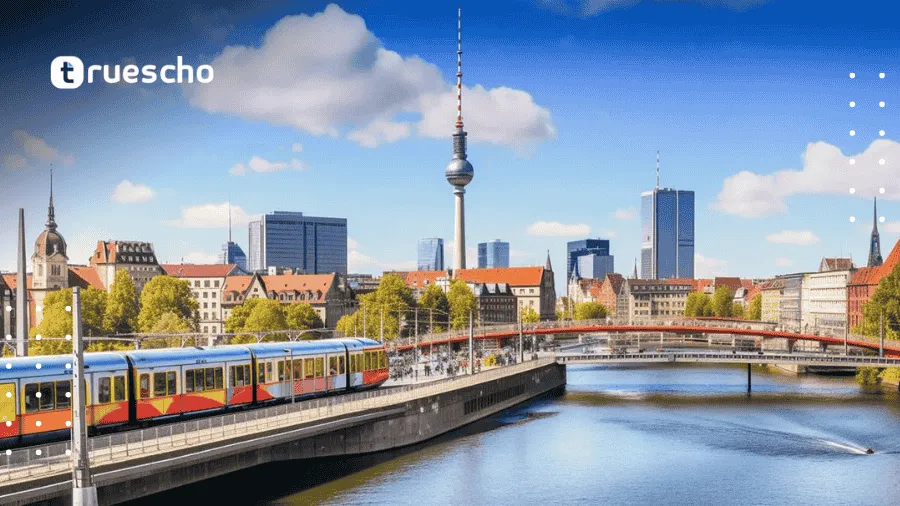Find an Apartment in Germany: 7 Tips for Affordable Housing
Table of Contents
- Understanding the German Housing Market
- Tip 1: Create a Shortlist of Potential Accommodations
- Tip 2: Consider Shared Housing Options
- Tip 3: Leverage Your Personal and University Networks
- Tip 4: Prepare a Strong Application
- Tip 5: Act Quickly and Apply Widely
- Tip 6: Be Diligent with the Rental Contract
- Tip 7: Be Aware of Additional Costs and Registration Requirements
- Additional Practical Tips for Finding Affordable Housing in Germany
- Conclusion
Understanding the German Housing Market
Germany is known for its well-regulated and competitive housing market – a place where demand often overshadows supply. From entire apartments to rooms in shared flats (commonly known as “Wohngemeinschaft” or WG), there are numerous options to suit varying budgets and lifestyles.
Before diving into the search process, it is important to understand the two main categories of rental accommodations:
- Shared Apartments (WG): Renting a room in a WG is particularly popular among students and young professionals. Splitting the rent with roommates can make living in expensive cities more affordable, although this option does involve sharing communal spaces like kitchens and bathrooms.
- Entire Apartments: If you prefer privacy, renting an entire apartment is ideal. However, these options come at a higher cost and often involve stricter competition.
Read also: German University Exams: Ultimate Exam Prep
Additionally, it’s essential to become familiar with common rental terms such as:
- Kaltmiete: This is the basic rent for the apartment, excluding additional costs like utilities.
- Warmmiete: The total rent you pay, including utilities such as water, electricity, heating, and sometimes internet.
- Kaution: A security deposit usually equivalent to two months’ rent that you pay upfront and which is returned upon moving out, provided there are no damages or unpaid fees.
- Wohnungsgeberbestätigung: A crucial confirmation from your landlord required for official city registration, which is necessary to open a bank account, secure a tax ID, and obtain a residence permit.
Tip 1: Create a Shortlist of Potential Accommodations
The first step in your apartment hunt in Germany is to create a shortlist of available accommodations. You can search both online and offline to get a comprehensive list of options based on your desired location, budget, and preferences.
Some of the best online resources to explore include:
- eBay Kleinanzeigen – Although primarily a platform for buying and selling used items, it also offers a robust accommodations section. The search is more informal, but filtering options by city and rental type makes it an excellent starting point.
- ImmoScout24 – Known as one of the most comprehensive and professional real estate portals in Germany. Keep in mind that listings on this site often have higher prices and fierce competition.
- ImmoWelt and Immonet – Similar professional portals that offer wide-ranging apartment listings across Germany.
Using these platforms, filter your search by parameters such as city, rental price, number of rooms, and whether the apartment is part of a shared flat or a private solution.
Tip 2: Consider Shared Housing Options
If affordability is a key concern, consider looking for a room in a shared apartment. This option, popular among students and young professionals, allows you to split the costs and access housing in cities where entire apartments may be too expensive.
A dedicated website for this purpose is:
- WG-Gesucht – This site specializes in shared housing opportunities and is particularly useful if you are open to living with others. In highly competitive markets like Munich, responsiveness and a well-written inquiry can make all the difference.
For short-term furnished rentals, which might provide a temporary solution while you search for more permanent housing, consider platforms such as:
Read also: Part-time Jobs in Germany for Students
Tip 3: Leverage Your Personal and University Networks
Often, one of the best ways to find an apartment in Germany is through personal connections. Friends, former classmates, and colleagues can provide invaluable leads on available accommodations before they hit the broader market.
Universities often have notice boards or online forums where students who are moving out post vacancies. Additionally, local newspapers sometimes carry apartment listings not found online. Don’t underestimate the power of word-of-mouth; networking can be your most effective tool in securing affordable housing.
“Student-to-student connections are often the most reliable way to find an apartment – they come with firsthand recommendations and a level of trust that may not be present in online listings.”
If you are a student, consider also contacting your local Studentenwerk (student union), which can assist in finding affordable accommodation or provide access to student housing with subsidized rent.
Tip 4: Prepare a Strong Application
When multiple applicants are vying for the same apartment, a well-prepared application can set you apart from the competition. Here are a few best practices to ensure your application shines:
- Create a Personalized Template: Develop a concise and informative application template. Include details about yourself, your background, and your reasons for wanting to rent the apartment. This template can be reused for every application, saving you time while maintaining professionalism.
- Attach Supporting Documents: Include necessary documents such as proof of university admission (if applicable), recommendation letters, and an updated credit report (known as “Schufa” in Germany). A work contract can also tremendously boost your credibility with the landlord.
- Include Quality Photos: If relevant, attach high-quality photos of yourself to personalize your application. This step is particularly useful when renting from more informal platforms like eBay Kleinanzeigen.
Remember, a well-rounded application not only communicates your seriousness about the apartment but also reassures the landlord of your reliability in paying the rent on time.

Tip 5: Act Quickly and Apply Widely
In competitive rental markets, it’s crucial not to delay. Many listings receive multiple inquiries within minutes of being posted. Once you have your documents ready and your application template polished, don’t hesitate to send in multiple applications simultaneously.
Consider the process similar to job hunting: the more high-quality applications you submit, the higher your chance of receiving a favorable response. Start your search at least three to four months in advance – especially if you are aiming for affordable housing in high-demand cities.
When you do receive a positive response, treat the apartment visit as an interview. Make sure to present yourself professionally, ask relevant questions, and confirm all important details about the apartment and rental terms.
Read also: Commonwealth Distance Learning Scholarships
Tip 6: Be Diligent with the Rental Contract
Before signing any rental contract, it’s imperative to thoroughly review the terms and conditions. Here are a few considerations to keep in mind:
- Inspect the Apartment: Always inspect the apartment, either in person or via a detailed virtual tour, to ensure it meets your expectations and that there are no hidden issues.
- Read the Contract Carefully: Pay close attention to the agreement’s clauses. Unfavorable terms can be hidden in poorly worded contract sections. If necessary, have a trusted advisor or even use a digital assistant to review the contract for you.
- Verify the Landlord’s Identity: Scams are not uncommon in competitive rental markets. Confirm the legitimacy of the landlord or rental agency before transferring any funds or signing the contract.
- Compare Prices: If you encounter listings that seem too good to be true, especially in highly priced areas like the city center, do additional comparisons. Prices that deviate significantly from the market average should be approached with caution.
By ensuring you understand every clause and verifying necessary details, you safeguard yourself from potential scams or unexpected financial liabilities later on.
Tip 7: Be Aware of Additional Costs and Registration Requirements
When budgeting for an apartment in Germany, remember that the advertised rent may not be the final amount you pay. In addition to the basic rent, there are variable supplementary costs to consider:
- Utility Costs: These include charges for water, electricity, heating, and sometimes internet fees. The basic rent (Kaltmiete) does not cover these.
- Rundfunkbeitrag (Broadcasting Fee): Every household in Germany is required to pay a monthly fee (currently around 18,36€) that supports independent public broadcasting. This fee is per household, not per person.
- Kaution (Security Deposit): As mentioned, the deposit is usually equivalent to two months’ rent and up front costs can add significantly to your initial expenses.
Additionally, once you have secured an apartment, you will need to obtain a Wohnungsgeberbestätigung from your landlord. This document confirms your residence and is mandatory for completing city registration. Without it, you might face challenges in accessing essential services like opening a bank account, obtaining a tax ID, or renewing your residence permit.
Detailing these extra expenses early on in your planning helps avoid any surprises later and ensures that you choose truly affordable housing in Germany.
Read also: Schwarzman Scholars Programme
Additional Practical Tips for Finding Affordable Housing in Germany
Here are a few bonus tips that can improve your chances of securing affordable and suitable housing:
- Improve Your German Language Skills: Many of the websites and documents are available in German. Even basic proficiency in German can provide an advantage and ease communication with landlords and agents.
- Stay Organized: Keep all your application materials, documents, and correspondence in a dedicated folder. Organization matters when facing tight deadlines and multiple submissions.
- Consider Temporary Solutions: If you are unable to secure a permanent apartment right away, consider short-term rentals such as Airbnb. This can provide a temporary base while you continue searching for a long-term arrangement.
- Be Persistent and Patient: The process of finding affordable housing in Germany can be competitive and time-consuming. Persistence is key – don’t be discouraged by initial rejections. Remember, the more applications you submit, the higher your chances of success.
- Utilize Official Resources: When in doubt or for further guidance, consult official resources such as local government housing offices or student unions for up-to-date information on available housing programs and best practices.
Conclusion
Finding an apartment in Germany, especially that ideal balance between affordability and quality, is certainly challenging – but with the right approach, it is entirely possible. By creating a focused shortlist, exploring both shared and private accommodations, leveraging your network, and presenting a well-rounded application, you increase your chances of success.
Don’t overlook the fine print: thoroughly review rental contracts, verify costs, and ensure that all documentation – including the mandatory Wohnungsgeberbestätigung – is in order. Moreover, being knowledgeable about local rental practices and additional fees like utilities or broadcasting charges can save you future hassles.
Whether you are a student or a professional embarking on a new chapter in Germany, these seven tips serve as your roadmap to finding that perfect, affordable apartment. With persistence, organization, and thorough preparation, you too can find your ideal home in Germany.
We hope these insights help demystify the process and empower you to take proactive steps toward securing affordable housing. For further guidance on improving your language skills and navigating everyday challenges in Germany, be sure to explore reliable resources and communities dedicated to expatriates and students alike.



